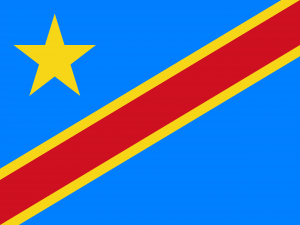Language/French/Culture/Congo–Kinshasa-Timeline
June 30, 1960[edit | edit source]
The Belgian Congo becomes independent and becomes the Republic of the Congo - before becoming the Democratic Republic of the Congo in 1964. Joseph Kasa-Vubu is its first president, democratically elected by the newly formed National Assembly. Patrice Lumumba, one of the fathers of independence, is appointed Prime Minister. About ten days later, Moise Tshombe, pro-Belgian leader and businessman, took control of the province of Kantanga, in the south of the country, and declared his independence. The United Nations sends troops there to restore order and reintegrate the province into the rest of the country. They succeed two years later.
Jan. 17, 1961[edit | edit source]
Patrice Lumumba, a supporter of the African giant’s rapprochement with the Soviet bloc, is kidnapped by order of the commander-in-chief of the armies, Joseph-Désiré Mobutu. The latter had tried five months earlier, in September 1960, to overthrow the government to end a disagreement between the Head of State and the Prime Minister. Lumumba is then taken to the secessionist region of Katanga and assassinated. The degree of involvement of the CIA and the Belgian government has still not been clearly established.
Nov. 24, 1965[edit | edit source]
Joseph-Désiré Mobutu Sese Seko officially seizes power in a coup against Joseph Kasa-Vubu. He was then applauded by the international community and a large part of the Congolese political class, paralyzed by deep disagreements at the head of the country.
June 24, 1967[edit | edit source]
Mobutu ratifies a new constitution, establishing an authoritarian one-party regime, the Popular Revolutionary Movement (MPR). Five years later, he proclaimed himself Marshal President.
April 1990[edit | edit source]
A new Constitution is adopted after several months of heated social protests. Multipartyism is once again accepted in the Democratic Republic of the Congo, which Mobutu renamed Zaire in the early 1970s in an effort to break with the colonial era. More than 200 political parties are born.
May 17, 1997[edit | edit source]
The first Congo war, involving several border countries, has been raging for several months. The Alliance of Democratic Forces for the Liberation of Congo (AFDL), backed by Rwanda and Uganda, entered the capital Kinshasa in May. On the 17th, Laurent-Désiré Kabila, leader of the AFDL proclaimed himself president of the country, thus putting an end to the conflict. Zaire becomes again the Democratic Republic of the Congo. Mobutu, a refugee in Morocco, died a few months later from cancer. A year later, the Second Congo War broke out, involving a total of nine countries and around thirty armed groups.
January 16, 2001[edit | edit source]
Laurent-Désiré Kabila is assassinated by his bodyguard. His son Joseph is appointed to succeed him. The latter set up a transitional government two years later.
June 30, 2003[edit | edit source]
Signing of the peace agreement officially ending the Second Congo War. According to NGOs, nearly four million people have been killed, killed in the fighting or victims of disease and famine. Millions of displaced people will find refuge in the neighboring countries of the Congo.
March 28, 2004[edit | edit source]
Attempted coup d'etat against Joseph Kabila. Armed men take control of two military camps, a naval base and an air base in Kinshasa. The coup d'état involved members of Mobutu's former bodyguard.
November 27, 2006[edit | edit source]
Joseph Kabila is declared the winner of the second Congolese presidential election by direct suffrage against Jean-Pierre Bemba, former vice-president in the transitional government and close to Mobutu. The gap between the towers is marked by violence. Supporters from both camps clash with heavy weapons in the streets of Kinshasa.
Source[edit | edit source]
World Timelines[edit source]
Other Lessons[edit | edit source]
- French Strikes Why
- Diego Garcia Timeline
- Funny idiomatic expressions
- French Southern Territories Timeline
- French territories
- Congo–Brazzaville Timeline
- Education
- French meals
- French Major Historical Dates
- St Barthelemy Timeline
- Cameroon Timeline
- Gabon Timeline
- Clipperton Island Timeline
- Coutries where French is an official language
- Vaincre ou Mourir

